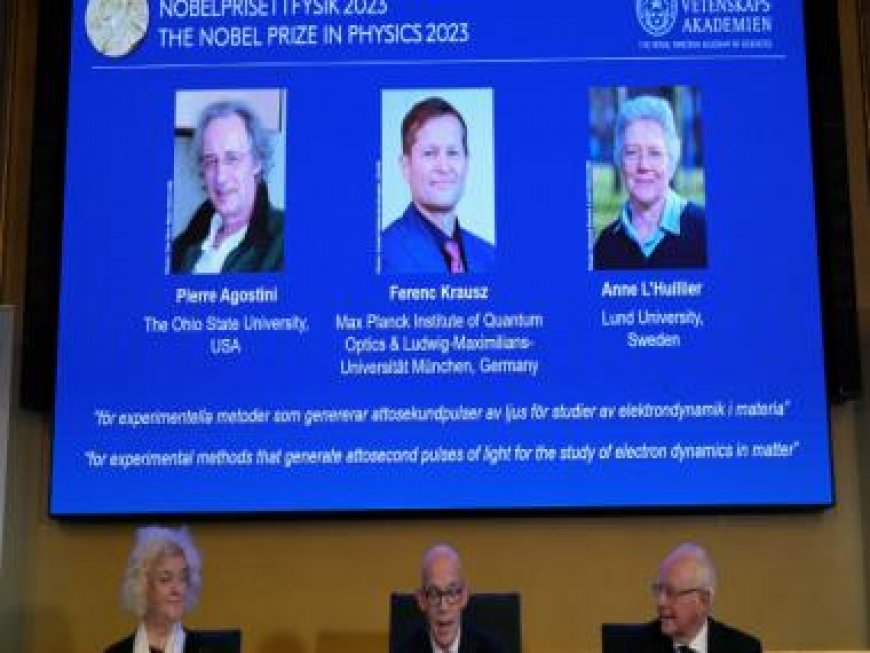Scientists who revealed secrets of the atom win Nobel physics prize
Scientists who revealed secrets of the atom win Nobel physics prize

The 2023 Nobel Prize in Physics was awarded to scientists Pierre Agostini, Ferenc Krausz, and Anne L’Huillier for developing ultra-short light pulses that can provide a snapshot of atomic changes and perhaps improve illness detection.
The winning academy said that their research has provided new methods for examining the motion of electrons inside atoms and molecules, a phenomena that was previously thought to be untraceable.
A few tenths of an attosecond, a time interval so brief that there are as many attoseconds in a second as there have been seconds since the universe’s creation, is all it takes for one electron to change.
“The ability to generate attosecond pulses of light has opened the door on a tiny, extremely tiny, time scale and it’s also opened the door to the world of electrons,” said Eva Olsson, member of the Nobel Prize in Physics Selection Committee.
The discoveries have potential applicability across a wide range of fields. Understanding and regulating how electrons act in a substance is crucial in electronics.
According to the academy, the field also shows promise in areas like a novel in-vitro diagnostic method to find the distinctive molecular signs of illnesses in blood samples.
Attosecond physics has been compared by Krausz, a Hungarian-born scientist, to a fast-shutter camera where the brief light flashes enable a freeze-frame view of the microcosm. His team produced the first ultra-fast pulses in the early 2000s.
“Just as you try to photograph a Formula 1 racing car with a fast camera, for example, as it runs through the finish line. You need a camera to take sharp snapshots and reconstruct the movement,” he told Reuters at the Max Planck Institute of Quantum Optics in Garching, Germany, where he is director.
“This is exactly the concept we use for the fastest movements that happen in nature outside the atomic nucleus, which is the movement of electrons.”
L’Huillier, who received word she had won the prize in the middle of a lecture, said, “it is really a prestigious prize and I’m so happy to get it. It’s incredible.” She proceeded with the lecture after the news, a half hour she described as “a bit difficult”.
Only the fifth woman to win a Nobel physics prize, French-born L’Huillier works at Lund University in Sweden, while Agostini, who was also born in France, is a emeritus professor at Ohio State University in the United States.
The two French winners were congratulated by French President Emmanuel Macron, who said on social media: “What pride for our Nation!”
In studies that he conducted starting in the 1980s, L’Huillier found a novel phenomena caused by the interaction of laser light with gaseous atoms. Then, Agostini and Krausz showed how this may be utilised to make light pulses that are shorter than previously achievable.
Agostini and his team in France were successful in manufacturing and researching a series of consecutive light pulses, similar to a train with carriages, whereas Krausz and his colleagues in Austria were working on a method that could choose a single pulse.
All of these investigations demonstrated that attosecond pulses could be seen, measured, and used to new research.
Krausz claimed he was attempting to process the reality of receiving the honour.
“I did not expect it. I am overwhelmed,” he said.
The academy was unable to immediately reach Agostini, who was in Paris, to give him the news. “I cannot believe it,” he told Reuters. “My daughter called me… That was the first I heard it.”
The medicine prize was received by American colleague Drew Weissman and Hungarian researcher Katalin Kariko for their work on the mRNA molecule, which paved the path for COVID-19 vaccinations. Physics is the second Nobel prize to be given this week.
The Nobel Prizes, established in the will of dynamite inventor and businessman Alfred Nobel, have been given out continuously since 1901 with a few hiccups, and have come to be regarded as the highest reward for scientists worldwide.
With victors like Albert Einstein and prizes for science that has radically altered how we view the world, the physics prize has frequently taken the stage alongside the award for peace.
The announcement of the physics prize will occur on consecutive workdays in early October, and it will be followed by ones for chemistry, literature, peace and economics, the latter a later addition to the original line-up.
(With agency inputs)
What's Your Reaction?



























































